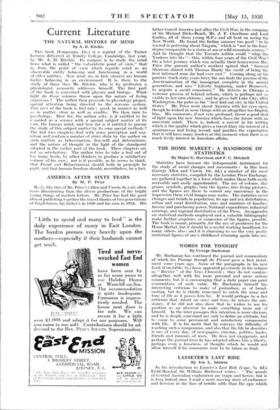Current Literature
This book (Longmans, 15s.) is a reprint_ of the Tamer lectures delivered at Trinity College, Cambridge, last year, by Mr. A. D. Ritchie. Its purpose is to study the mind from what is called " the naturalistic point of view," that is, froth the point of view which regards mind as an observable entity behax ing and functioning in a world of other entities. Now what we, in fact, observe are human bodies behaving in an environment. It is, then, to the study of these that Mr. Ritchie, who is by profeSsion a physiologist, primarily addresses himself. The first part of the book is concerned with physics and biology. What light do these sciences throw upon the nature of living organisms ? The author then proceeds to physiology proper, special attention being directed to the nervous system. This pale of the book is first-rate ; good, in manner as well as in matter, clear as well as erudite. We then turn to psy. etiology. HoW far, the author asks, is it entitled to be re4arded as a science with a special subject matter of its 0-,vn, the human mind, and how far is it entitled to pursue the study of this subject matter by its own special methods ? The last two chapters deal with sense perception and cog- nition and contain a number of obiler dicta by the author on such matters as behaviourism, free-will and determinism, and the nature of thought in the light of the standpoint adopted in the earlier part of the book. These chapters are not so satisfactory. The author tries to take a leaf out of too Many books by other thinkers to produce a satisfactory volume of his own ; nor is it possible, as he seems to think, that Freud and Behaviourism should both in principle be right, and that human freedom should, nevertheless, be a fact.






















































 Previous page
Previous page